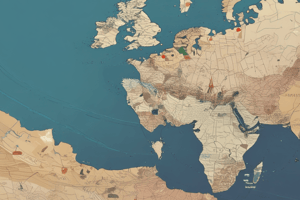Podcast
Questions and Answers
What is the significance of understanding war according to the text?
What is the significance of understanding war according to the text?
What is the role of intellectual revolutions in shaping the nature of power?
What is the role of intellectual revolutions in shaping the nature of power?
What was the primary motivation behind the Religious Wars of the 16th and Early 17th Centuries?
What was the primary motivation behind the Religious Wars of the 16th and Early 17th Centuries?
According to Trotsky, what is the reality of war?
According to Trotsky, what is the reality of war?
Signup and view all the answers
How do economic revolutions influence the use of power?
How do economic revolutions influence the use of power?
Signup and view all the answers
What is the relationship between Kratos and Ethos in the context of war?
What is the relationship between Kratos and Ethos in the context of war?
Signup and view all the answers
What was a key factor that intensified the conflicts in Europe during the 17th century?
What was a key factor that intensified the conflicts in Europe during the 17th century?
Signup and view all the answers
What was a characteristic of the Thirty Years War (1618-1648)?
What was a characteristic of the Thirty Years War (1618-1648)?
Signup and view all the answers
What was a significant outcome of the Treaty of Westphalia (1648)?
What was a significant outcome of the Treaty of Westphalia (1648)?
Signup and view all the answers
What was a key limitation imposed on wars by the Treaty of Westphalia?
What was a key limitation imposed on wars by the Treaty of Westphalia?
Signup and view all the answers
What was a characteristic of warfare during the 17th and 18th centuries?
What was a characteristic of warfare during the 17th and 18th centuries?
Signup and view all the answers
What was a constraint on the size of armies during the 17th century?
What was a constraint on the size of armies during the 17th century?
Signup and view all the answers




